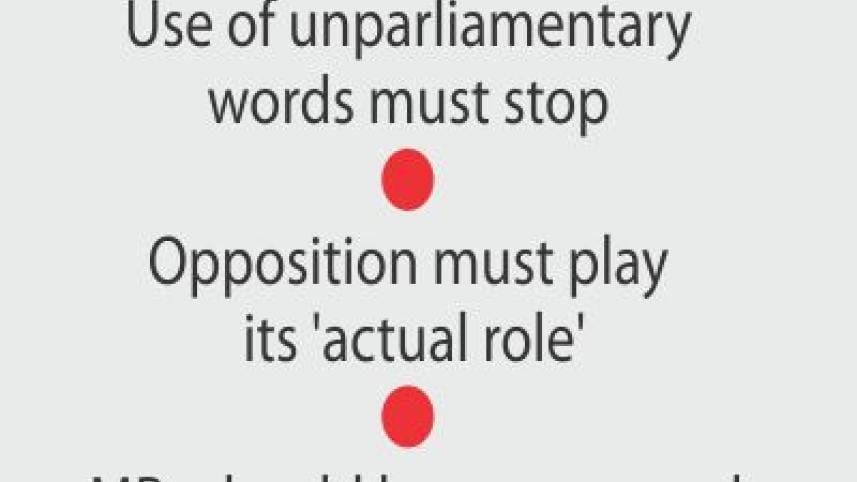Hail government, blast BNP

Only 29 of 350 lawmakers of the current parliament participated in the process of enactment of 30 laws in 14 months, indicating their lack of interest in lawmaking, according to a study of Transparency International Bangladesh.
They, however, were enthusiastic about praising their political parties and blasting the BNP-led alliance, which has no representation in the present House.
Treasury and opposition bench MPs praised their parties and the government 7,500 times, and criticised the BNP-led combine 7,268 times, says the study based on parliament's second to sixth session from June 2014 to July this year.
In TIB's view, criticism of the BNP-led alliance was irrelevant, and unparliamentary words were used for blasting the combine.
In the ninth parliament, MPs of the ruling AL lauded their party 599 times and slated the BNP-Jamaat coalition 804 times, while in the eighth parliament, MPs of the ruling BNP praised their party 626 times and criticised the Awami League 491 times.
In the current parliament, the lawmakers' participation in question-answer sessions and discussions on important notices was less, and only six percent of 388 working hours were spent on formulation and passage of the 30 laws.
Besides, 41 MPs didn't take part in any parliament proceedings in the 14-month period, says the study report launched at a press conference at the TIB headquarters in the capital yesterday.
It also mentioned the absence of the Speaker's strong role in stopping the use of unparliamentary words in the House.
The study said the main opposition, the Jatiya Party, failed to play its due role in the present parliament formed through the one-sided election on January 5, 2014 amid boycott by the BNP-led alliance.
Terming the JP so-called opposition, the TIB said the party was working as "B-team of the government".
Citing an instance, it said the MPs of the main opposition and some parties moved motions opposing some segments of the Constitution (16th amendment) Bill 2014. But later they voted in favour of the bill, going against their own motions.
The study says though proposals for eliciting public opinion over various bills were placed in the House, those were turned down by voice votes.
QUORUM CRISIS
According to the study, quorum crisis ate up 48 hours and 41 minutes from the second to sixth session, causing a waste of around Tk 32.42 crore in 112 working days of the five sessions.
When parliament is in session, about Tk 111,000 is spent a minute for running it.
POSITIVE SIDES
This parliament has some accomplishments that include an increase of average time for passage of bills and ease of quorum crisis.
The main opposition staged fewer walkouts from parliament than in the cases of the eighth and ninth parliaments. This, however, doesn't mean that the opposition in the 10th parliament is playing a positive role in parliamentary activities, says the TIB.
12 RECOMMENDATIONS
The TIB said the Speaker didn't take action to stop use of unparliamentarily language in the House. The Speaker will have to play a stronger role in this regard.
It put forward a 12-point recommendation for making parliament effective and accountable, and strengthening democracy.
The TIB suggested passing a bill on lawmakers' conduct and urged the opposition to play its due role in the House.
TIB FOR INCLUSIVE POLLS
Replying to a question at the press conference, TIB Executive Director Iftekharuzzaman put stress on the holding of an inclusive and credible election to make parliament effective, saying the last national election was a "controversial one".
"Definitely, the January-5 election was a controversial one. When a fresh election is held without controversy, nobody will term it controversial."
The TIB hopes an inclusive election will be held with the participation of all parties, but it depends on the country's top politicians, he said.
REACTION FROM PARTIES
Asked about the TIB study, AL Joint Secretary General Mahbubul Alam Hanif said the current opposition is playing its due role in making parliament effective.
"If an effective parliament means the use of abusive words and frequent boycott of parliament like the BNP did [in the ninth parliament], we have nothing to say about the TIB observations on the current opposition," he said.
Jatiya Party Secretary General Ziauddin Ahmed Bablu rejected the TIB report, saying it is nothing but a "false report".
"We have been playing the role of real opposition in parliament."
The opposition staged walkouts over a number of issues, including price hike of power and gas, he said.
"Is it our fault that we did not use slang words like BNP MPs did in the past?" he asked.
However, BNP Spokesperson Asaduzzaman Ripon said the TIB study was a reflection of public sentiment about the opposition. "The TIB has proved that the BNP's claims about the opposition are true."


 For all latest news, follow The Daily Star's Google News channel.
For all latest news, follow The Daily Star's Google News channel.
Comments